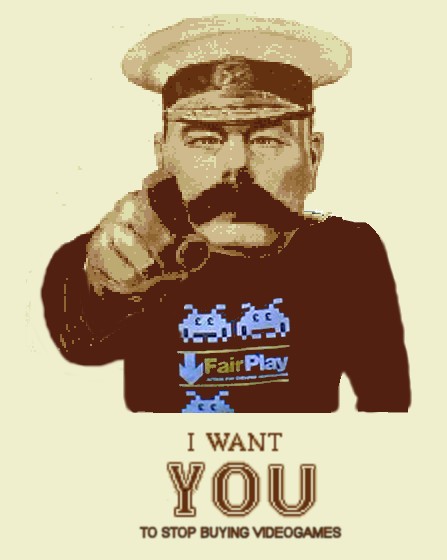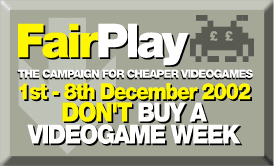 |
||
|
||||||
|
Click to hear FairPlay debate the campaign with ELSPA on BBC Radio 5 Live Breakfast, Sat 7 December. (If this is your first visit to the FairPlay site, click here to read more about the campaign.) |
||||||
|
Our work here is done. |
||||||
|
We've achieved pretty much all we can for now. The FairPlay Campaign did more to bring the issue of rip-off videogame pricing into the public eye than has ever been done before. Attracting coverage in scores of publications, from the smallest website to the largest of national newspapers and broadcasting institutions, over 500,000 people heard our message on this website alone, and millions more through other media. The industry's paralysing fear of debating the issue with us (the link above was the only time they dared go head-to-head with the campaign) says more than we ever could about the truth of our claims, but the campaign was vindicated in many more ways. 1. Nintendo's conviction by the European Court during the campaign, and huge £100m fine, for illegally fixing prices at an artificially high level. 2. The massive waves of price-cutting in the UK during the Christmas season - normally the most lucrative time for videogame sales - which meant practically every game in the release schedules could be bought on the High Street for £10-15 below the RRP. 3. The big sales blip during the campaign week which saw Game, Europe's biggest videogame retailer, lose a massive 80% of its share value overnight in response to disappointing sales. When the campaign was over, sales shot up again. 4. A long line of disastrous financial results, redundancies and studio closures among publishers and developers continued to demonstrate the economic unsoundness of the industry's current business model. 5. Huge reductions in the pricing of, particularly, the Xbox and Gamecube, leading to massive sales increases. 6. Dixons Group and Game, two of Europe's biggest game retailers, slashing the price of all Gamecube software to between £15 and £25, resulting in enormous sales boosts.
7. And most rewarding of all, the news, reported
by IGN, that Nintendo have quietly restructured their licensing fee exactly
in accordance with the primary demand of the FairPlay Campaign, so that
publishers can now sell games at a variety of prices without having to pay the
same fixed licencing fee to Nintendo. |
||||||
|
x |
||||||
 x x |
||||||
|
Want to look this stylish while protesting? |
||||||
|
||||||

